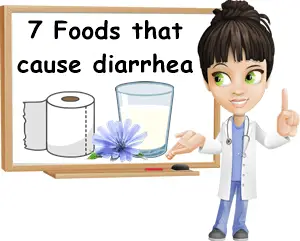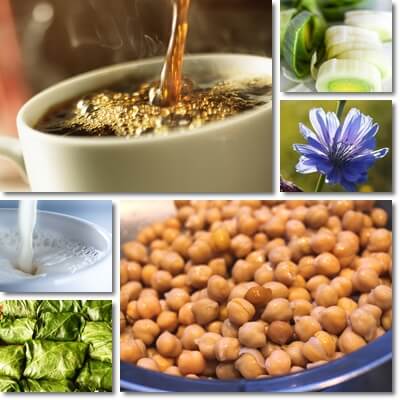Diarrhea is not always infectious, as in gastroenteritis. Diarrhea is not necessarily functional, that is, caused by a functional gastrointestinal disorder such as irritable bowel syndrome (IBS), even though it tends to occur in response to the same foods, for example. Diarrhea can very well be a normal response to a high intake of dietary fiber or a high intake of fiber and fluids, or a very normal reaction to irritant components in food or components in food one is simply less tolerant of. And there are plenty of common foods that cause this type of diarrhea.
Fortunately, this type of diarrhea tends to resolve itself, typically after the first or first few loose bowel movements that make sure to evacuate the food that your GI system didn’t agree with.
(1) Coffee
Everybody knows drinking coffee has a laxative effect, causing urgent trips to the bathroom a few minutes to a couple of hours after that first cup. For some people, other caffeinated beverages or coffee-infused foods such as tiramisu have a laxative effect, although typically less pregnant than coffee itself. What causes coffee to be one of the most common foods that cause loose stools and diarrhea is a pharmacological effect owed to its main components (e.g. caffeine) which increase rectosigmoid motor activity within 4 min after ingestion in some people (source). Take a look of what is best to eat during diarrhea.

(2) Coffee substitutes
A lot of people who give up coffee do so not because of its laxative effects, which they tend to see as a benefit. But coffee substitutes are not all they’re made up to be, as in ideal options for substituting coffee with. It’s true, coffee substitutes are less irritating on the stomach lining, for example, which is a benefit for people with gastritis who can’t have coffee anymore, but love the taste and still want to have some semblance of normalcy in their lives in terms of diet. And there are other benefits too. But the matter of fact is, they are not without side effects.
For instance, a popular coffee substitute is malted barley. Malted barley is essentially barley subjected to a process called malting during which the barley grains are soaked in water and germinated, but not fully, then dried with hot air to halt germination. The process develops enzymes that break the starches in the barley grain into fermentable sugars, but also break the proteins so that they can be used by yeast to grow. The process alone is a source of compounds that can trigger fermentation in the gastrointestinal tract and subsequent loose stools and diarrhea upon consumption of the coffee substitute. Of course, not everyone experiences this side effect and it’s been noted that it’s also dose dependent.
Barley can also be roasted and ground to make an increasingly popular coffee substitute known in Italy as ‘caffe d’orzo’. But if anyone has any type of sensitivity, intolerance or allergy to barley starches or other proteins, loose stools and diarrhea should be expected side effects.
Another popular coffee substitute is chicory root. Chicory root is used as a treatment for constipation. Chicory root is high in inulin, a carbohydrate and fiber known to ferment in the colon, and a prebiotic that feeds good gut bacteria. While it promotes gastrointestinal health through its effects on gut microbiota, it can also cause side effects such as flatulence, burping, abdominal cramps and loose stools and diarrhea. The side effects tend to be more pronounced in those with functional gastrointestinal disorders such as irritable bowel. Also see the benefits of chicory root.
Other similar coffee substitutes that may potentially cause loose stools and diarrhea include dandelion root, wheat bran, rye, but also bean-based coffee substitutes (garbanzo bean coffee substitute, lupine or lupin, chickpea etc.). So just because there are healthier options because they lack caffeine, that doesn’t mean coffee substitutes are completely without side effects, even though most are relatively harmless and resolve themselves soon after consumption is discontinued.

(3) Beans
Garbanzo beans or chickpeas, peas, kidney beans, pinto beans, navy beans and other types of beans are common foods that cause loose stools and diarrhea. Their laxative effects are typically directly proportional with intake.
Beans in general are high in fiber, with some varieties being up to 40% fiber per weight (e.g. lupin kernels). Eating too many beans at once or too often in a short time span can easily cause loose stools and diarrhea.
In addition to the fiber, beans have been found to contain sugars that are difficult to digest and, as a result, cause gastrointestinal side effects such as flatulence (e.g. raffinose, stachyose).
(4) Cabbage
Whether it’s green, white, red or purple, cabbage is a vegetable many people steer away from. While raw cabbage tends to be a little more forgiving, maybe because people don’t eat as much of it, cooked cabbage is known to cause gastrointestinal symptoms such as bloating, flatulence and diarrhea.
In addition to being a good source of dietary fiber (about 2.5 g of fiber/100 g), cabbage also contains raffinose and other complex sugars that are difficult to digest and, as a result, may trigger digestive upset. Some people are more sensitive to such components than others, especially those who eat more processed foods rather than foods closer to their natural state, but also those with existing gastrointestinal disorders.
(5) Dairy milk
Dairy milk is one common food that can cause loose stools and diarrhea, but the underlying mechanisms are diverse depending on the type of milk consumed and other factors. For instance, raw dairy milk can cause diarrhea if it’s contaminated with bacteria, viruses or parasites. Dairy milk in general causes diarrhea in anyone with moderate to severe lactose intolerance, a condition characterized by a person’s inability to digest the sugar in milk known as lactose. Other symptoms of lactose intolerance include bloating, flatulence, burping, abdominal cramps and even nausea and vomiting sensation.
Even people who are not regular milk drinkers, but not actually lactose intolerant may experience digestive upset with nausea, bloating, burping and even loose stools and diarrhea. It is possible to increase your tolerance to dairy milk over the course of a few months by including it in your diet in small amounts (both sweet and sour or fermented dairy milk) along with fresh cheese, yogurt and fermented or aged milk products which may potentially help stimulate the production of the enzyme lactase needed to digest the lactose in milk and milk itself.
There is also dairy milk allergy which is a potentially life-threatening condition triggered by an allergic reaction to milk proteins. Dairy milk allergy can cause skin symptoms typical of an allergic reaction (hives), respiratory symptoms (hoarseness, wheezing, difficulty breathing), inflammatory symptoms (swelling of the tongue, throat) and, in severe cases, anaphylactic shock which is a medical emergency.
(6) Onions and garlic
Onions and garlic are two common foods that can cause diarrhea. Some people are simply intolerant of the pungent vegetables and consumption above a certain amount can trigger digestive symptoms ranging from heartburn and acid reflux to nausea, vomiting sensation, abdominal cramps, loose stools and diarrhea. Both onions and garlic are irritants in nature so a higher intake can trigger digestive upset and gastrointestinal side effects such as diarrhea even in individuals who are not necessarily intolerant to them.
(7) Fruits with edible skin and seeds
It is common for people to experience loose stools and even diarrhea after eating fruits with edible skin and seeds, either fresh or dried (e.g. apples, pears, peaches, nectarines, apricots, plums, strawberries, kiwifruit, mulberries, dried apples, prunes, dried figs etc.). This is most common in individuals who do not normally eat them, or fruits in general.
Fruits with edible skin and seeds, whether fresh or dried, are important sources of both soluble and insoluble dietary fiber and (over)consumption can easily lead to loose stools and diarrhea. If you are drinking water or having other fluids with the fruits, then the effects may be more pregnant. Eating kiwifruit or dried figs or prunes and drinking a glass or two of water first thing in the morning when you wake up is a popular remedy for constipation.
Also see these 8 surprising foods that cause diarrhea.
Conclusion
Coffee, coffee-infused beverages and foods, coffee substitutes such as dandelion root, chicory root or barley grain, beans, milk, cabbage and a few other common foods have been known to cause loose stools and diarrhea. That isn’t to say these foods will cause loose stools and diarrhea in absolutely every person that consumes them. But if you do experience loose stools and diarrhea or other digestive system-related side effects following consumption of these foods, then it’s good to know that they can be a possible cause. You may consider excluding them from your diet for a few days to see if indeed they are indeed the source of your digestive issues, or reduce intake or frequency of consumption to be able to still enjoy them, but without the digestive upset.
